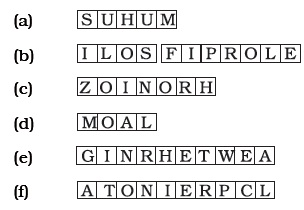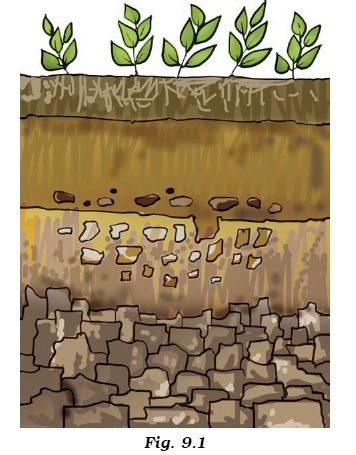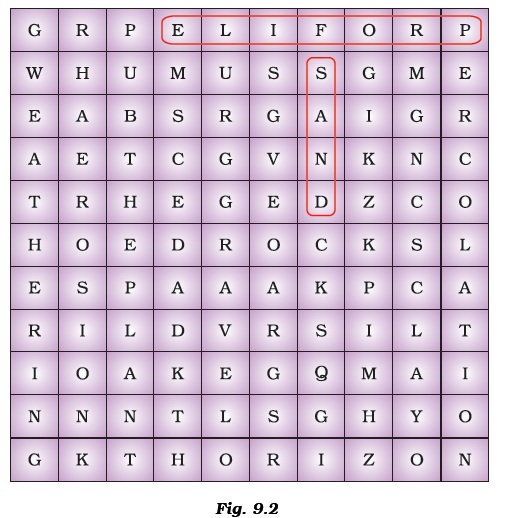Candidates can download NCERT Exemplar Class 7 Science Unit 9 from this page. The exemplar has been provided by the National Council of Educational Research & Training (NCERT) and the candidates can check it from below for free of cost. It contains objective, very short answer type, short answer type, and long answer type questions. Along with it, the answer for each question has also been provided. From the NCERT Exemplar Class 7 Science Unit 9, candidates can understand the level and type of questions that are asked in the exam.
NCERT Exemplar Class 7 Science Unit 9 Soil
NCERT Class 7 Science Unit 9 is for Soil. The type of questions that will be asked from NCERT Class 7 Science Unit 9 are displayed in the below provided NCERT Exemplar Class 7 Science Unit 9. With the help of it, candidates can prepare well for the examination.
Also Check: NCERT Solutions Class 7 Science
Multiple Choice Questions
- The microorganisms present in the soil require moisture (water) and nutrients for growth and survival. Choose from the options below the habitat (place) where the soil has plenty of water and nutrients.
(a) Desert
(b) Forest
(c) Open field
(d) Cricket ground - Availability of water and minerals in the soil for maximum absorption by roots is in the –
(a) B-horizon
(b) C-horizon
(c) A-horizon
(d) surface of soil - Soil conservation measures are mainly aimed at protecting which of the following?
(a) Plants
(b) Top soil
(c) Sub soil
(d) Soil organisms - Read the following statements with reference to soil.
(i) Weathering is a very fast process of soil formation.
(ii) Percolation of water is faster in sandy soils.
(iii) Loamy soil contains only sand and clay.
(iv) Top soil contains the maximum amount of humus.
Choose the correct statements from the above.
(a) (ii) and (iv)
(b) (i) and (iii)
(c) (ii) and (iii)
(d) (i) and (ii)
Very Short Answer Type Questions
- Soil has particles of different sizes. Arrange the words given below in increasing order of their particle size.
Rock, Clay, Sand, Gravel, Silt - The components of loamy soil are ______, ______ and ______.
- Read the following statements and give the appropriate terms for each of them.
(a) The process of breakdown of rocks by the action of wind, water, sunlight.
(b) Removal of top soil during heavy rains or strong winds.
(c) Accumulation of wastes in the soil generated by human activity which alter the features of soil.
(d) The process of movement of water into deeper layers of soil. - Unscramble the following jumbled words related to soil.

Short Answer Type Questions
- Which of the following situations – ‘A’ or ‘B’ – is advantageous for absorption of water and minerals? Why?
Situation ‘A’ : Growth and branching of roots in the C-horizon.
Situation ‘B’ : Growth and branching of roots in A and B Horizons. - How can a farmer convert acidic soil to neutral soil?
- Is it a good practice to remove grass and small plants that are growing in an open, unused field? Give reason to support your answer.
- A man digging a pit found that he could dig with ease initially but digging became difficult as he went deeper. He could not dig beyond a depth of 5 feet. Provide a suitable scientific explanation.
- Locate the following zones given as boxed items in Figure 9.1 which shows a diagram of soil profile.
Top soil, Subsoil, C-horizon, Bedrock
- Rajasthan is a desert state in India. Once while travelling to Rajasthan by train, Boojho observed several streams and rivulets of rain water during the journey but to his surprise he did not see streams of water in the desert region even during rains. Help Boojho find a suitable explanation for this.
- Match the animals in Column I with their natural place of dwelling (habitat) in Column II.

Long Answer Type Questions
- Continuously water-logged soils are disadvantageous for plant growth. Why?
- Why is soil erosion relatively less in dense forests as compared to barren, open fields?
- Gardeners gently dig up the soil around the roots of garden herbs (plants) frequently. Give reasons.
- In towns and cities, generally, the bore wells have to be dug very deep to get water as compared to bore wells dug in villages. Give suitable reasons.
- Several terms related to soil are hidden in the squares given as Figure 9.2. Spot them and make a list.Two examples are given for you.

Answers



To get study material, exam alerts and news, join our Whatsapp Channel.